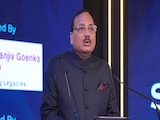Just 24 hours ago in Argentina, Pune received the C40 Bloomberg Philanthropies Award for being a global leader in tackling air pollution. This is awarded to cities that champion the most impactful climate action projects in the world. I am proud to say that this award is a testament to the work we did as part of the Maha Vikas Aghadi - a government that prioritized development and selflessly served the people of Maharashtra for two and a half years.
Pune is a fast-growing city that consistently ranks among India's most liveable and clean cities. However, levels of particulate matter (PM) in the city are more than ten times what the WHO deems safe for human life, resulting in the increased risk of bronchitis, asthma and heart problems for its citizens. The transport sector accounts for 25% of Pune's PM emissions, making it central to the air pollution in the city. Pune has among the highest number of 2-wheelers and 4-wheelers in India. The city is also among the most congested in India.
Long before we notified the ambitious and widely-acclaimed Maharashtra EV Policy in 2021, I was working to ensure our cities upheld safe, clean, and affordable transportation as a core priority for the people of Maharashtra. As part of the policy, we set ambitious EV targets for Pune, aiming to make it the leader in India's mobility revolution. To do this, we knew that our policies had to move from paper to projects, ultimately reaching the people.
With this in mind, we started working with PMPML (Pune and Pimpri-Chinchwad's transport provider) on electrifying its bus fleet. The idea was simple: we needed a holistic solution to the multiple problems the city faced, one that addressed pollution and congestion while ensuring 31 lakh Punekars had access to affordable, comfortable and clean transportation.
It was crucial to focus on citizen-centric development to improve the city's ease of living. To achieve this, we launched the Pune EV Cell last year - India's first dedicated cell to accelerate EV adoption in a city. This cell brought together government agencies, experts, industry and most importantly, citizens, to ensure that Pune could solve its pollution, congestion, and transportation problems.
Within a short time, this cell yielded strong results - 25% of Pune's buses are already EVs, meaning that the city is on-track to achieve its EV targets 2 years ahead of the policy deadline. The city will have 650 e-buses and 300 mini e-buses by 2023, while setting up at least 250 public/semi-public charging stations. Most importantly, we announced that the city will no longer procure any diesel buses. It is a widely known fact that e-buses are quieter, less polluting, and more comfortable. The 650 e-buses will save emissions equal to those of 2,000 petrol cars over their entire lifetime. These AC buses will help many of the city's two-wheeler commuters to beat the heat and travel comfortably, reducing commuter fatigue and congestion.
Swapping diesel buses for EVs also makes strong financial sense - as EVs are cheaper to operate over their lifetime compared to diesel vehicles. This change will save the public exchequer 450 crores over the lifetime of these 650 e-buses as compared to diesel buses. Through innovative public private partnerships, like the one started by Mumbai's BEST, the PMPML paid operators by the kilometre and significantly reduced costs to put e-buses on the roads.
Pune historically is also India's automotive manufacturing hub, attracting crores of investments and jobs to the state of Maharashtra. With a steadfast development-driven approach, the MVA had a vision to make Pune the EV manufacturing hub of India and create lakhs of jobs for our citizens. To attract investments in EV manufacturing and charging, we hosted the 'Pune Alternative Fuel Conclave' earlier this year which was flagged off by then former Chief Minister Uddhav Thackeray, former Deputy Chief Minister Ajit Pawar and former Revenue Minister Balasaheb Thorat. This conclave put Pune on the global map for clean mobility and helped showcase its vision to other cities in the world. This was a huge success, with a massive turnout from industry, investors, banks, businesses, experts and citizens that wanted to support the ambition we had for Pune. We pledged to replicate the EV cell initiative in key cities in Maharashtra.
After countless conversations with Environment Ministers and mayors from around the world, we were not surprised to find that Maharashtra's EV revolution was way faster (and more economical) than major cities globally. Even though the MVA was unfortunately (and unconstitutionally) ousted from the government, we are glad to see that many of our initiatives are yielding successful results. It is reassuring to see that no amount of mud-slinging can take away the achievements of good governance and development-driven, citizen-centric policy-making.
I wholeheartedly congratulate the Pune city officials for winning this well-deserved award and am hopeful that we will soon be able to realize the vision MVA had for Pune.
(Aaditya Thackeray was a minister in Maharashtra and is President of Yuva Sena, the Shiv Sena's youth wing.)
Disclaimer: These are the personal opinions of the author.















